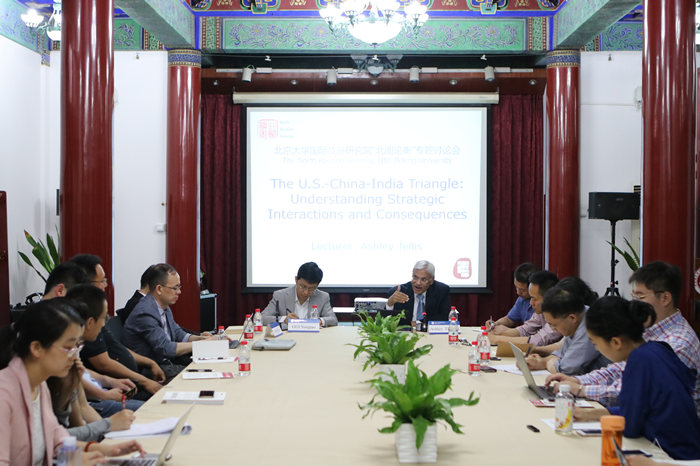
On the evening of May 16, 2019, the Institute of International and Strategic Studies (IISS), Peking University (PKU) held the 35th seminar of "North Pavilion Seminar" series. Ashley J. Tellis, a renowned international security and U.S. foreign policy expert and senior fellow at the Carnegie Endowment for International Peace, gave a seminar entitled "the U.S.-China-India Triangle: Understanding Strategic Interaction and Consequences". The seminar was hosted by Gui Yongtao, Vice President of the IISS and Vice President of the SIS, PKU.
Tellis first pointed out that the intersection of Sino-U.S. relations and Sino-India relations in the U.S.-China-India triangle will become more important in the next few years. How to manage China's rise is the key factor to the direction of competition between the powers. In the face of China's rise, the U.S. has to answer three fundamental questions: can the U.S. maintain an open international system? Can the U.S. maintain an open global trading system even if the system is opposed by its middle class? Can the U.S. respond to the rise of China in the current situation of Sino-U.S. interdependence? The three major questions India has to answer are: can India live in peace with the superpower next door? Can India balance Chinese influence with its own strength? If there is no option left except than alliance with China, can India keep its independence in the alliance? The essence of the U.S.-China-India triangle is an attempt made by the U.S. and India to constantly use the other side as a lever to try to resolve their respective problems.
Thales pointed out that the interaction of the three countries reflects their respective goals, strategies, and results. The goals of the U.S. are to ensure its hegemony in Asia and the world, to maintain its alliance system, and to extend its economic prosperity through technological innovation. The corresponding strategies are to find new partners while maintaining its current allies, to maintain its military advantage, and to maintain a highly flexible and open domestic market. China's overall goals are to maintain domestic order, to move towards prosperity through high growth, and to improve overall national strength. Its corresponding strategies are to establish an intra-Asian market network while participating in the international market, to carry out Eurasian infrastructure construction through export of capital, and to build adequate military capabilities. Facing India, China has two specific goals. The first is to maintain as many partnerships as possible with India while eliminating India's territorial challenges. The second is to check India's efforts to balance China’s influence with the help of external allies. The corresponding strategies are to strengthen economic cooperation with India and to let India pay more attention to South Asia's own affairs. India's main goals are to accelerate domestic development and develop economic power, to protect its own security by strengthening its hegemony in South Asia, and to seek ways to balance China’s influence. India's strategies are to focus on internal reforms, to establish new diplomatic relations with other countries (especially China and the U.S.) and participate in the efforts within Asia to balance Chinese influence, and to strengthen the relations with the U.S. The relations between the two countries will be strengthened by their common worries about the rise of China.
Tellis drew three conclusions. First, in the face of China's rise, the U.S. seeks to increase its strength. One of the important means is to actively seek ways of increasing India's strength. Second, China limits the willingness of India to form an alliance with the U.S. through a combination of cooperation and check. Third, India is trying to get what it wants without effort by building a partnership with the U.S. that is the strongest in its history but has not reach the level of alliance.
In the final discussion session, Tellis had in-depth exchanges and discussions with the teachers and students present at the seminar on issues such as the bilateral relations between the U.S. and Saudi Arabia and the U.S.-India nuclear cooperation agreement. (Contributed by Zeng Chuyuan)
Editor: Li Fangqi, photography: Zheng Peijie

